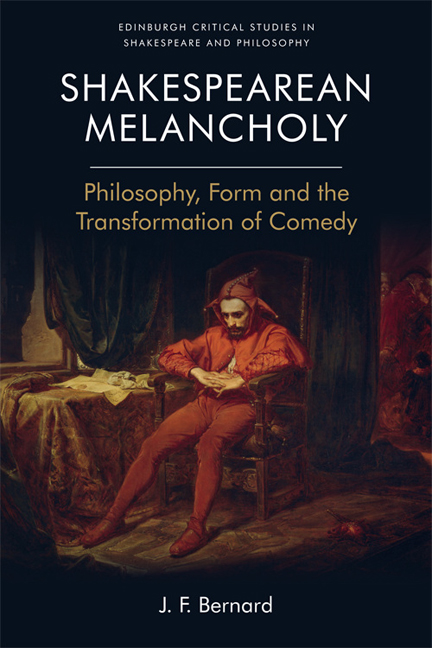Book contents
- Frontmatter
- Contents
- Acknowledgements
- Series Editor's Preface
- Miscellaneous Frontmatter
- 1 What's so Funny about Humours? Melancholy, Comedy and Revisionist Philosophy
- 2 Comic Symmetry and English Melancholy
- 3 Melancholic Dissonance and the Limits of Psycho-Humoralism
- 4 Melancholic Ambience at the Comic Close
- 5 Melancomic Time in Late Shakespeare
- 6 The Philosophical Afterlives of Shakespearean Melancholy
- Works Cited
- Index
1 - What's so Funny about Humours? Melancholy, Comedy and Revisionist Philosophy
Published online by Cambridge University Press: 14 September 2018
- Frontmatter
- Contents
- Acknowledgements
- Series Editor's Preface
- Miscellaneous Frontmatter
- 1 What's so Funny about Humours? Melancholy, Comedy and Revisionist Philosophy
- 2 Comic Symmetry and English Melancholy
- 3 Melancholic Dissonance and the Limits of Psycho-Humoralism
- 4 Melancholic Ambience at the Comic Close
- 5 Melancomic Time in Late Shakespeare
- 6 The Philosophical Afterlives of Shakespearean Melancholy
- Works Cited
- Index
Summary
Tragedy is when I cut my finger. Comedy is when you fall into an open sewer and die.
(Mel Brooks)In the induction to The Taming of the Shrew, Christopher Sly is tricked into thinking that he is a wealthy Lord who ‘these fifteen years … have been in a dream’ (Induction, II, 79). A servingman subsequently informs him that
Your honour's players, hearing your amendment,
Are come to play a pleasant comedy,
For so your doctors hold it very meet,
Seeing too much sadness hath congealed your blood,
And melancholy is the nurse of frenzy.
Therefore they thought it good you hear a play
And frame your mind to mirth and merriment,
Which bars a thousand harms and lengthens life.
(Induction, II, 125–32, emphasis mine)In its broadest sense, the scene plays out an elaborate jest on Sly, who gullibly accepts whatever information his ‘attendants’ provide. Servants convince him to watch the play by asserting that doing so has been recommended for him by his physicians to offset a medical condition: his blood is apparently too cold, contaminated by the bodily substance known as melancholy. The implication of such a diagnosis is that exposure to the merriment of comedy will nurse him back to health. In actuality, the above-quoted speech offers dramatic exposition to frame the actual comedy about to unfold. Yet the casual conflation of theatre and medicine suggests a familiarity that resonates beyond Taming's induction. Dramatically, Sly is about to witness the same play as Shakespeare's audience, and the detailed description the servingman provides, along with Sly's willingness to accept it, suggests a broader early modern awareness – at least culturally – of the physician's prognosis concerning his melancholic state. This deceptively informal dovetailing of theatre and medicine provides a point of departure for the analysis of melancholy in Shakespearean comedy that I undertake here.
Michael Bristol perhaps said it best when he wrote that ‘nothing is more idiosyncratic than melancholia, and yet nothing is more public and histrionic in its expression’.2 Melancholy is ubiquitous and paradoxical. Its daunting and intrinsically contradictory nature epitomises life itself. Overlapping through the ages, its oxymoronic definitions form a truly eclectic tapestry of human behaviour.
- Type
- Chapter
- Information
- Shakespearean MelancholyPhilosophy, Form and the Transformation of Comedy, pp. 1 - 55Publisher: Edinburgh University PressPrint publication year: 2018



